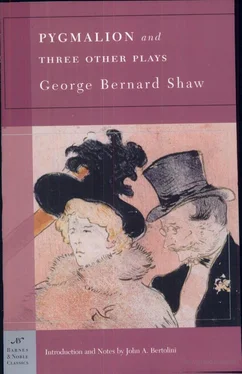In Lever’s story there is a real change of attitude. There is no relenting towards Potts: he never gains our affections like Don Quixote and Pickwick: he has not even the infatuate courage of Tappertit. But we dare not laugh at him, because, somehow, we recognize ourselves in Potts. We may, some of us, have enough nerve, enough muscle, enough luck, enough tact or skill or address or knowledge to carry things off better than he did; to impose on the people who saw through him; to fascinate Katinka (who cut Potts so ruthlessly at the end of the story); but for all that, we know that Potts plays an enormous part in ourselves and in the world, and that the social problem is not a problem of story-book heroes of the older pattern, but a problem of Pottses, and of how to make men of them. To fall back on my old phrase, we have the feeling — one that Alnaschar, Pistol, Parolles, and Tappertit never gave us — that Potts is a piece of really scientific natural history as distinguished from comic story telling. His author is not throwing a stone at a creature of another and inferior order, but making a confession, with the effect that the stone hits everybody full in the conscience and causes their self-esteem to smart very sorely. Hence the failure of Lever’s book to please the readers of Household Words. That pain in the self-esteem nowadays causes critics to raise a cry of Ibsenism. I therefore assure them that the sensation first came to me from Lever and may have come to him from Beyle, or at least out of the Stendhalian atmosphere. I exclude the hypothesis of complete originality on Lever’s part, because a man can no more be completely original in that sense than a tree can grow out of air.
Another mistake as to my literary ancestry is made whenever I violate the romantic convention that all women are angels when they are not devils; that they are better looking than men; that their part in courtship is entirely passive; and that the human female form is the most beautiful object in nature. Schopenhauer wrote a splenetic essay which, as it is neither polite nor profound, was probably intended to knock this nonsense violently on the head. A sentence denouncing the idolized form as ugly has been largely quoted. The English critics have read that sentence; and I must here affirm, with as much gentleness as the implication will bear, that it has yet to be proved that they have dipped any deeper. At all events, whenever an English playwright represents a young and marriageable woman as being anything but a romantic heroine, he is disposed of without further thought as an echo of Schopenhauer. My own case is a specially hard one, because, when I implore the critics who are obsessed with the Schopenhaurian formula to remember that playwrights, like sculptors, study their figures from life, and not from philosophic essays, they reply passionately that I am not a playwright and that my stage figures do not live. But even so, I may and do ask them why, if they must give the credit of my plays to a philosopher, they do not give it to an English philosopher? Long before I ever read a word by Schopenhauer, or even knew whether he was a philosopher or a chemist, the Socialist revival of the eighteen-eighties brought me into contact, both literary and personal, with Mr. Ernest Belfort Bax, an English Socialist and philosophic essayist, whose handling of modern feminism would provoke romantic protests from Schopenhauer himself, or even Strindberg. At a matter of fact I hardly noticed Schopenhauer’s disparagements of women when they came under my notice later on, so thoroughly had Mr. Bax familiarized me with the homoist [5] One who vaunts the worth of the male gender.
attitude, and forced me to recognize the extent to which public opinion, and consequently legislation and jurisprudence, is corrupted by feminist sentiment.
But Mr. Bax’s essays were not confined to the Feminist question. [6] That is, the question of whether women are morally superior to men.
He was a ruthless critic of current morality. Other writers have gained sympathy for dramatic criminals by eliciting the alleged “soul of goodness in things evil”; [7] Quotation from Shakespeare’s Henry V (act 4, scene 1).
but Mr. Bax would pro-pound some quite undramatic and apparently shabby violation of our commercial law and morality, and not merely defend it with the most disconcerting ingenuity, but actually prove it to be a positive duty that nothing but the certainty of police persecution should prevent every right-minded man from at once doing on principle. The Socialists were naturally shocked, being for the most part morbidly moral people; but at all events they were saved later on from the delusion that nobody but Nietzsche had ever challenged our mercanto-Christian morality. I first heard the name of Nietzsche from a German mathematician, Miss Borchardt, who had read my Quintessence of Ibsenism, and told me that she saw what I had been reading: namely, Nietzsche’s Jen seits von Gut und Bose. [8] English translation: Beyond Good and Evil (1886).
Which I protest I had never seen, and could not have read with any comfort, for want of the necessary German, if I had seen it.
Nietzsche, like Schopenhauer, is the victim in England of a single much quoted sentence containing the phrase “big blonde beast.” {3} 3 3 (p. 10) Nietzsche, like Schopenhauer, is the victim in England of a single much quoted sentence containing the phrase “big blonde beast”: The phrase, from Nietzsche’s The Genealogy of Morals (1887; First Essay, section 11), refers to the noble animal element that reemerges from time to time in heroic peoples. “Blonde,” according to Nietzsche’s translator, Walter Kaufmann, refers not to the Teutonic races but to a lion’s mane.
On the strength of this alliteration it is assumed that Nietzsche gained his European reputation by a senseless glorification of selfish bullying as the rule of life, just as it is assumed, on the strength of the single word Superman (Ubermensch) borrowed by me from Nietzsche, that I look for the salvation of society to the despotism of a single Napoleonic Superman, in spite of my careful demonstration of the folly of that outworn infatuation. But even the less recklessly superficial critics seem to believe that the modern objection to Christianity as a pernicious slave-morality was first put forward by Nietzsche. It was familiar to me before I ever heard of Nietzsche. The late Captain Wilson, author of several queer pamphlets, propagandist of a metaphysical system called Comprehensionism, and inventor of the term “Crosstianity” [9] Shaw borrows F. J. Wilson’s term for the morbid dwelling on Christ’s suffering.
to distinguish the retrograde element in Christendom, was wont thirty years ago, in the discussions of the Dialectical Society, to protest earnestly against the beatitudes of the Sermon on the Mount as excuses for cowardice and servility, as destructive of our will, and consequently of our honor and manhood. Now it is true that Captain Wilson’s moral criticism of Christianity was not a historical theory of it, like Nietzsche’s; but this objection cannot be made to Mr. Stuart-Glennie, the successor of Buckle as a philosophic historian, [10] john S. Stuart-Glennie (1832 — 1909?) was a Scots writer and historian; English historian Henry Thomas Buckle (1821 — 1862) is the author of History of Civilization in England.
who has devoted his life to the elaboration and propagation of his theory that Christianity is part of an epoch (or rather an aberration, since it began as recently as 6000 B.C. and is already collapsing) produced by the necessity in which the numerically inferior white races found themselves to impose their domination on the colored races by priestcraft, making a virtue and a popular religion of drudgery and submissiveness in this world not only as a means of achieving saintliness of character but of securing a reward in heaven. Here you have the slave-morality view formulated by a Scotch philosopher [11] In later editions Shaw added here “of my acquaintance,” after he had become friends with Stuart-Glennie.
long before English writers began chattering about Nietzsche.
Читать дальше












